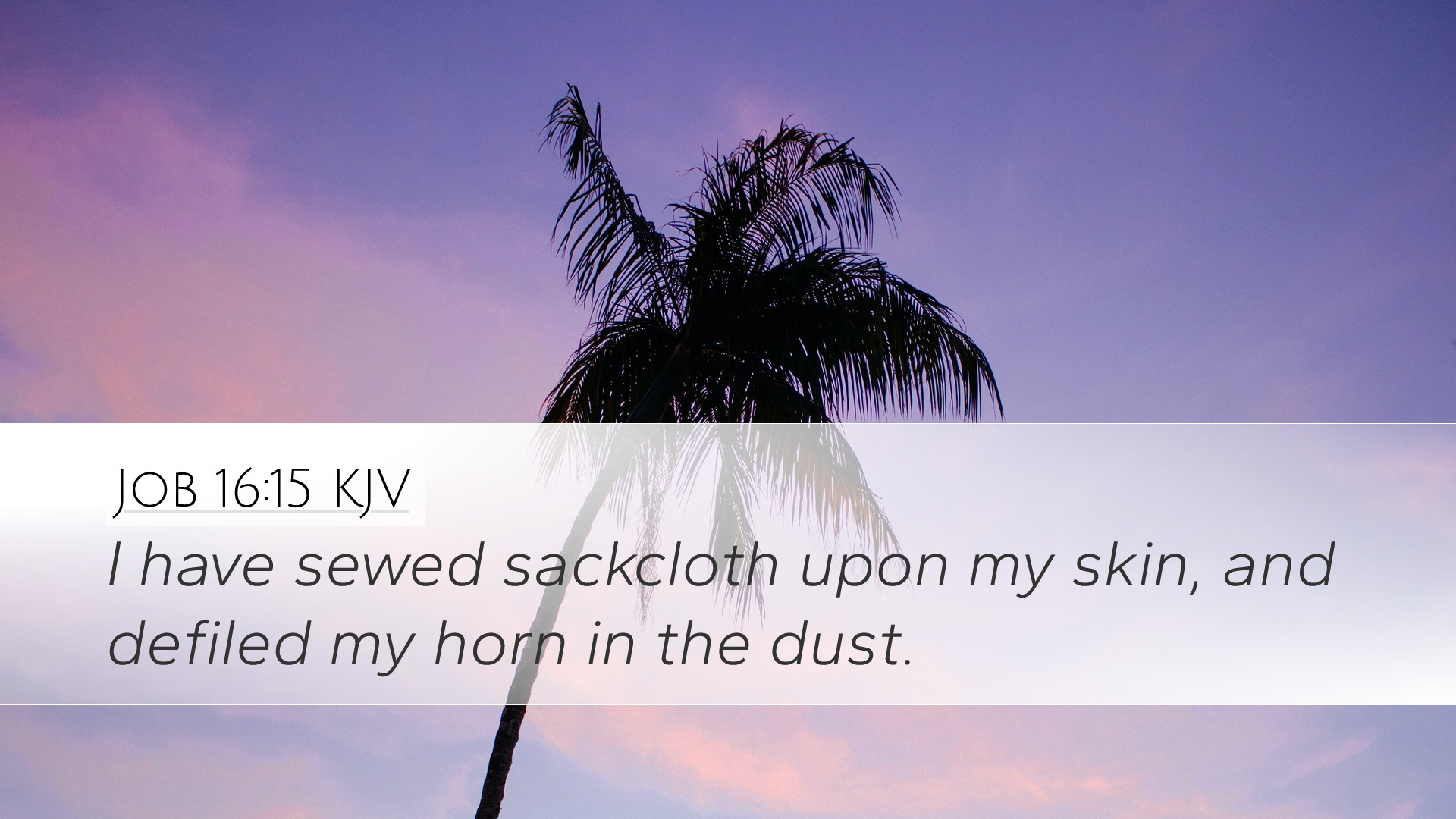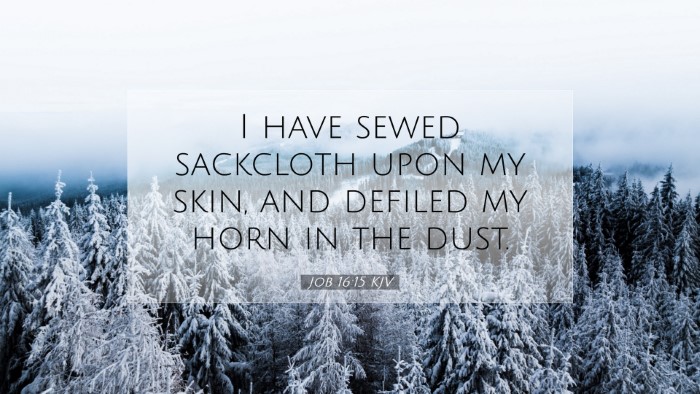Old Testament
Genesis Exodus Leviticus Numbers Deuteronomy Joshua Judges Ruth 1 Samuel 2 Samuel 1 Kings 2 Kings 1 Chronicles 2 Chronicles Ezra Nehemiah Esther Job Psalms Proverbs Ecclesiastes Song of Solomon Isaiah Jeremiah Lamentations Ezekiel Daniel Hosea Joel Amos Obadiah Jonah Micah Nahum Habakkuk Zephaniah Haggai Zechariah MalachiJob 16:15
Job 16:15 KJV
I have sewed sackcloth upon my skin, and defiled my horn in the dust.
Job 16:15 Bible Commentary
Commentary on Job 16:15
Verse: "I have sewn sackcloth upon my skin, and laid my hand upon myust; my face is foul with weeping, and on my eyelids is the shadow of death."
Introduction
The book of Job presents an exploration of profound suffering and the quest for understanding amidst adversity. Job 16:15 stands as a poignant expression of Job's emotional and spiritual turmoil. In this verse, Job laments his plight, marking a moment of deep sorrow as he moves towards personal reflection and dialogue with God. Public domain commentaries provide significant insights into this distressing yet pivotal moment in Job’s narrative.
Contextual Analysis
Job, a figure of immense suffering, contends with the loss of his wealth, health, and family. As a righteous man, he engages in a dialogue with his friends, who attempt to reason his afflictions through a lens of retributive justice. This chapter captures Job's reaction to his friends’ unhelpful responses and his deepening despair.
Matthew Henry's Commentary
According to Matthew Henry, Job begins to express his feelings and afflictions more vividly in this passage. Henry notes that Job’s act of donning sackcloth is symbolic of mourning and humbling oneself before God. This clothing signifies grief, reflecting Job’s understanding of his plight and his desire for divine intervention.
- Sackcloth as Mourning: Henry emphasizes that sackcloth is not just an outward sign, but an inward cry for comfort and understanding. Job’s external actions echo his inner turmoil, showcasing a poignant connection between his physical distress and spiritual cry.
- Significance of Weeping: The phrase "my face is foul with weeping" indicates the profound sorrow Job feels. Henry reflects on how tears are a natural response to pain and can even bring a sense of relief as one wrestles with grief.
- Shadows of Death: The "shadow of death" on his eyelids underscores the severity of Job's anguish. It suggests not only a fear of death but a feeling of being enveloped by suffering. Henry points out that such expressions resonate with the human experience of despair.
Albert Barnes' Commentary
Albert Barnes provides insight into the linguistic aspects of the verse, elaborating on the use of sackcloth as a traditional symbol of mourning in ancient cultures. He notes that Job’s use of "I have sewn sackcloth upon my skin" could indicate that he is not merely using sackcloth as a garment, but it serves as a personal act of humility and desperation before God.
- Personal Affliction: Barnes suggests that Job's choice to lay his hand on dust represents his mortality and fragility. It symbolizes his acknowledgment of human weakness and the insignificance of man before divine authority.
- Visual Imagery: The imagery of “foul with weeping” is striking, as Barnes explains that it highlights Job's physical deterioration due to grief, presenting a holistic view of suffering that encompasses body, mind, and spirit.
- Impending Death: The "shadow of death" suggests a looming presence. Barnes relates this to the Hebrew understanding of death as both a physical end and a spiritual concern, pushing Job to question his existential reality.
Adam Clarke's Commentary
Adam Clarke’s commentary takes a theological perspective, incorporating a deep understanding of the Hebrew language and cultural context. Clarke examines the verse from a rich, philosophical angle, noting that Job encapsulates the human condition of suffering while seeking divine justice.
- Symbolism of Dust: Clarke asserts that dust serves as a powerful metaphor for human mortality. Job’s act of placing his hands in dust signifies recognition of his life’s fragility and the temporal nature of human existence.
- Divine Silence: Clarke points out that Job’s deep sorrow is compounded by God’s silence. This silence evokes the tension between human suffering and the expectation of divine intervention, leading to a deeper existential contemplation.
- Hope Amidst Despair: Despite the overwhelming sorrow, Clarke illuminates Job’s underlying hope—his yearning for vindication and justice, which resonates with the theological tenet of seeking God amidst trials.
Thematic Reflections
This passage embodies several key themes worth exploring for pastors, theologians, and scholars:
- Human Suffering: Job's expression exemplifies the intense nature of human suffering. The text invites readers to engage with the reality of pain and the importance of grieving in a biblical context.
- The Nature of God: Job’s lamentation raises the question of God's presence in suffering. This challenges believers to contemplate the nature of divine justice and love, especially in times of despair.
- Hope and Restoration: Although Job’s current state is dire, the narrative ultimately points toward hope and divine restoration, a vital message for those experiencing trials.
Conclusion
Job 16:15 encapsulates the depth of human suffering and the cry for understanding in the face of existential despair. Through the insights of Matthew Henry, Albert Barnes, and Adam Clarke, we see the multi-faceted nature of Job's anguish and the profound theological implications it holds for believers. This commentary serves as a reminder that suffering is a deeply communal and spiritual journey, emphasizing the necessity of seeking God amidst life’s greatest trials.


